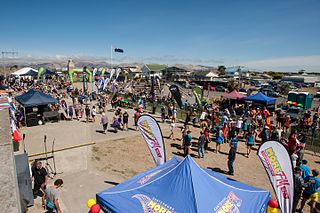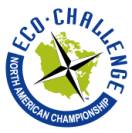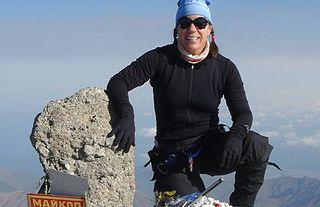
Adventure racing is typically a multidisciplinary team sport involving navigation over an unmarked wilderness course with races extending anywhere from two hours up to two weeks in length. Some races offer solo competitions as well. The principal disciplines in adventure racing include trekking, mountain biking, and paddling although races can incorporate a multitude of other disciplines including climbing, abseiling, horse riding, skiing and white water rafting. Teams generally vary in gender and in size from two to five competitors, however, the main format is considered to be mixed-gender teams of four racers. There is typically no suspension of the clock during races, irrespective of length; elapsed competition time runs concurrently with real-time, and competitors must choose if or when to rest.

Sir Russell Coutts is a world champion New Zealand yachtsman. He won an Olympic gold medal and skippered three Americas Cup victories in 1995, 2000, and 2003.
The Raid Gauloise or The Raid is considered by many to be the first modern expedition adventure race and was first held in 1989 in New Zealand as "la grande traversée". Its creator, Gérard Fusil, took the existing concept of long distance endurance races like the Whitbred Round the World Yacht Race, and focused on the team aspects, requiring each competitor to be part of a five-person co-ed team supported by a two-person logistics crew. The Raid had no set course, with competitors being required to rely on their wits and judgment to reach the specified checkpoints. The Raid was named after its original sponsor, the Gauloises Cigarette Company.
The Alpine Ironman was first held on 21 October 1980 in New Zealand. It was a three-day race featuring skiing, trail running and kayaking. The idea for the event came from Robin Judkins, who became the race's director, and his friend and business partner Peter Tocker; they were running Motatapu Canoes in Wānaka. Judkins was skiing with the general manager of Radio Otago and asked for a job as a radio announcer. A few days later, Judkins was asked to do a voice test by talking about his idea for the Alpine Ironman. He made up a story as he went along, including that Peter Hillary would be competing, and that the first prize would be a trip around the world. When the radio station told him that they wanted to broadcast this recording, Judkins was dumbfounded: "You're joking." They didn't, and Judkins went to Christchurch to find a sponsor, and organised the event within five weeks.

Robin Austin Judkins is a New Zealand sports administrator. He created the Alpine Ironman and the Coast to Coast, races that are often credited for being the origin of adventure racing. He has published an autobiography, Mad Dogs: Life on the Edge.

The racing of Thoroughbred horses is a popular gaming and spectator sport and industry in New Zealand.

The Coast to Coast is a non-standard multisport competition held annually in New Zealand. It is run from the west coast to the east coast of the South Island, and features running, cycling and kayaking elements over a total of 243 kilometres (151 mi). It starts in Kumara Beach and traditionally finished in the Christchurch suburb of Sumner, but since 2015 finishes in New Brighton. The event was created in 1983 by Christchurch personality Robin Judkins, who sold the rights to Queenstown-based tourism company Trojan Holdings in 2013. Richard Ussher took over from Judkins as race director in 2015. In 2019, Glen Currie was contracted to continue on from Richard Ussher in the role of race director.

Eco-Challenge: The Expedition Race is a multi-day expedition length adventure race in which teams of four competed. It originally aired on TV from April 1995 to April 2002. Based closely on the Raid Gauloises adventure race, the broadcast of Eco-Challenge led to the popularity of the adventure racing.

Stephen Bruce Gurney is a New Zealand multisport and triathlon athlete. He has won the Coast to Coast race a record nine times.

Richard Stanaway is a racing car driver from New Zealand. He currently competes full-time in the Supercars Championship, driving the No. 26 Ford Mustang GT for Grove Racing.

Frontier Adventure Sports and Training (FAST) is the most establishedneeds citation adventure race organizer in Canada, in operation since 1997. Frontier Adventure Sports has established an international reputation for solid logistics and challenging racecourses. FAST hosts events under several banners: the Frontier Adventure Challenge, Raid the North and Raid the North Extreme. These non-stop races range in length from 8 hours to six days and require coed teams of three or four to hike, mountain bike, paddle and negotiate fixed ropes, while navigating an unmarked racecourse through the wilderness.

Richard Arland Ussher is a New Zealand multisport athlete. He has represented his country at the 1998 Winter Olympics and is a five-time winner of the Coast to Coast multisport race, and formerly held the New Zealand Ironman-distance Triathlon record at 8hr 2min 15sec. From 2015-18, he was the race director for the Coast to Coast.

Terri Schneider is an endurance athlete, motivational speaker, author, coach, and consultant. In 1990, she won the Escape from Alcatraz and took third place at the 1990 Ironman World Championship.

The 34th annual America's Cup was a series of yacht races held in San Francisco Bay in September 2013. The series was contested between the defender Oracle Team USA team representing the Golden Gate Yacht Club, and the challenger Emirates Team New Zealand representing the Royal New Zealand Yacht Squadron. The format was changed radically to a best of 17, and Oracle Team USA defended the America's Cup by a score of 9 to 8 after Team New Zealand had built an 8 to 1 lead. Team New Zealand won the right to challenge for the Cup by previously winning the 2013 Louis Vuitton Cup. The 34th America's Cup's race schedule was the longest ever, in terms of number of days and number of races, and the first since the 25th America's Cup to feature both teams in a match point situation.
The Adventure Racing World Series (ARWS) is an endurance racing season where adventure racing teams compete in a range of disciplines including, for example, navigation, trekking, mountain biking, paddling and climbing.

Anton Cooper is a New Zealand cross-country cyclist who races for the Trek Factory Racing XC Team. He is the 2015 World Under 23 Cross-country Mountain bike champion and the 2012 World Junior Cross-country Mountain bike champion. One of the two contenders for the country's 2016 Summer Olympics quota spot, he developed chronic fatigue earlier in 2016 and the nomination went to Sam Gaze instead. Cooper represented New Zealand at the 2020 Summer Olympics in Tokyo, finishing sixth in the Men's Cross-country Mountain Bike final.
Ian Adamson is a former competitive adventure racer, television professional and president of World Obstacle, the Fédération Internationale de Sports d’Obstacles (FISO).
Kathleen Lynch is a retired competitive cyclist from New Zealand who competed both on and off the road. With a talent for multiple sports disciplines, she won the canoeing events New Zealand White Water Downriver and Slalom Championships in 1987 and represented her country at the 1988 Canoe Slalom World Cup. Around the same time, she was also a successful triathlete, but did not continue with that sport. She bought her first mountain bike in 1988 at the age of 31 in order to compete in an adventure sport event, and within a year she had become the New Zealand national cross country champion. Around the same time, she also took up road cycling. She was included in the New Zealand team for the 1990 Commonwealth Games and was assigned as domestique for the top New Zealand road rider, Madonna Harris. Harris and Lynch finished in fourth and ninth places respectively. In September 1990, Lynch competed at the inaugural UCI Mountain Bike World Championships and finished tenth. In November 1990, she became a household name in New Zealand by winning a 22-day multi-sport race the length of the country that had prime time TV coverage every night.

Rebecca Rusch is an American endurance professional athlete, seven-time World Champion, author, entrepreneur, Emmy Award winner, and motivational speaker. Rusch's career has spanned adventure sports including rock climbing, adventure racing, whitewater rafting, cross-country skiing and mountain biking.
John Jacoby is an Australian adventure racer. In the mid-1980s, he dominated the world in canoe marathon, winning three successive world cup canoe marathons before becoming the inaugural ICF canoe marathon world champion at the 1988 event in Nottingham, United Kingdom. After the 1988 World Championship, he retired from International Canoe Federation (ICF) events and concentrated on adventure racing.













